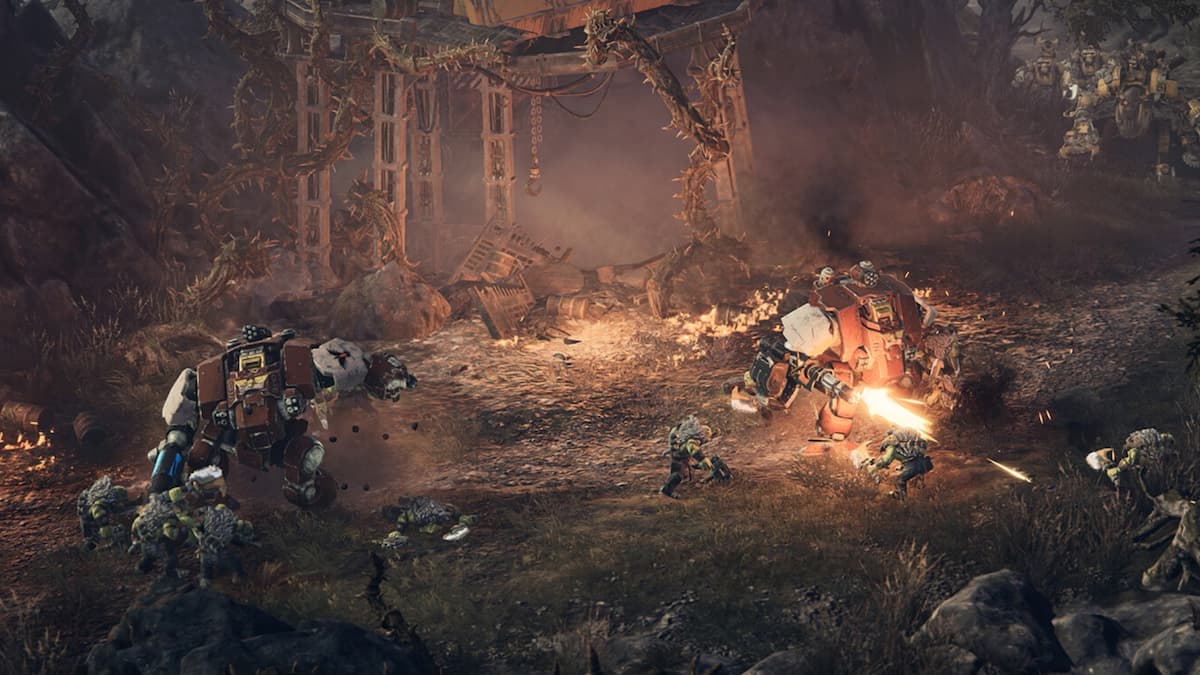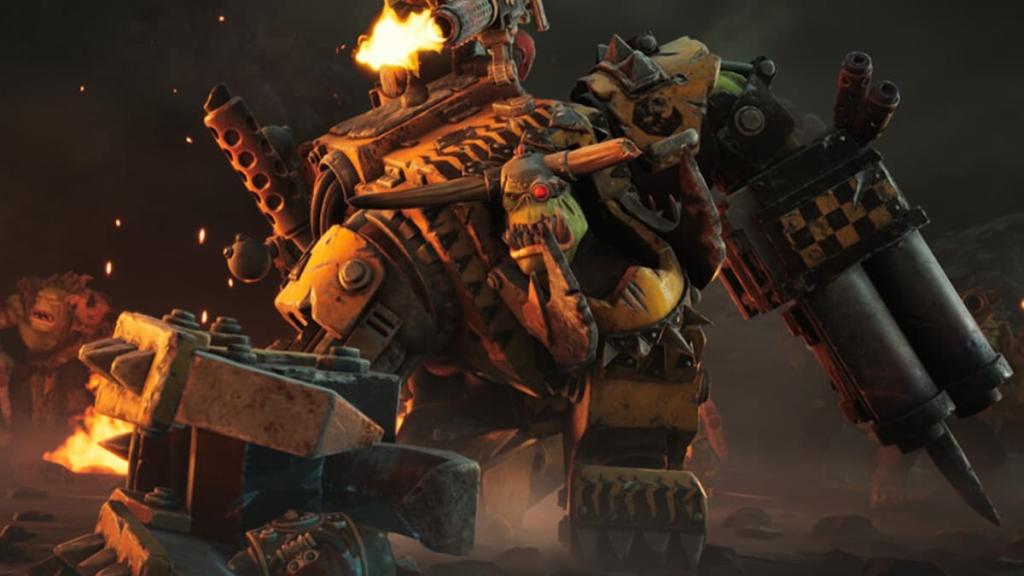
Warhammer 40K: Dawn of War was unveiled during Gamescom 2025's ONL, giving us a little peek at what's coming to the long-standing franchise.
Seeking to reinvigorate classic RTS gameplay by sticking to the original games' formula, developer KING Art, known for its work on Iron Harvest, is reaching for the future by looking back. Dawn of War 3 was notoriously a disappointing entry in the series, with the fourth game now under heavy scrutiny and attention from veteran fans and newcomers alike.
During day two of Gamescom 2025, we got to speak with Jan Theysen, KING Art's co-founder and Dawn of War 4's creative director. Theysen spoke on his and the team's experience with Iron Harvest, doing something new with the Dawn of War formula, alongside providing valuable insight into the upcoming title's development, features, and more.
Here's the full interview.
Note: Parts of this interview were edited to avoid repetition and enhance text clarity.

When you were offered the chance to develop a Dawn of War game, a huge RTS property with a huge fan base, one very loyal not only to the Warhammer 40K IP, but the Dawn of War series itself, what was the initial reaction like? What were the thoughts going through the team's heads?
Jan Theysen (Dawn of War 4 creative director): Yeah, it was crazy. We were working on Iron Harvest, our previous RTS game, which was, as you know, our first RTS and a Kickstarter game. And we were like, “What?” Games Workshop was asking us to suggest what we would do with Dawn of War 4. It was crazy. We said, sure, we'll make you a concept and present it, but never thought in a hundred years that this was actually what would happen, because usually stuff like that just doesn't happen.
Everybody was super excited when it actually happened, but the next reaction was, “Uh, oh, now we actually have to do it. We have to deliver it.” As you said, [Dawn of War] has a huge following, [there are] a lot of 40K fans and fans of [Games Workshop], and we want to do it right. So, yeah, everyone was super excited at first, [and then said], “Okay, now, let's get to work.”
When you were going into creating this game, especially as we say, it has a very storied history, a lot of very beloved characters, the Warhammer world, lore [which] stretches on and on, how important was it for you to take the existing material and continue the story and be loyal to the fan base that has played these games for years?
Theysen: I think there are some things that people would just expect from a Dawn of War 4. But on the other hand, I'm not sure how much people are excited about us continuing the story from previous installments, especially the last one. Because we have the Blood Ravens in the game, and we tell the story of two of the more prominent ones, like Cyrus or Jonah Orion. But, we said that we don't want Gabriel Angelos in the game at this point, for example, because we felt he might be just a little bit overpowered and [wouldn't be] a great fit.
So, we said we'll take the essentials and create something new.
And one of the big things for us was that we really wanted to have four distinct campaigns for the four different factions. So it's not like there's [only a] Space Marine campaign, and sometimes [a switch to a] different faction. It's [rather] four different factions, each of them with two to four heroes. So there are a lot of characters in there, and we [are] trying to make it our own thing.
Since we are talking about a game that seems to be going for a rich story campaign, and even for co-op, do you think that it was important to aim for this solo campaign experience, based on player feedback, especially when it feels like a lot of RTS games nowadays are focusing primarily on online multiplayer?
Theysen: When we started [working on] Iron Harvest, we did a survey. We just asked people, “Hey, what are you expecting from a modern RTS game? What do you want to see?” And it was very clear that people are really looking for great singleplayer and campaign experiences. Of course, there are also people who like multiplayer. There is multiplayer in the game, obviously, but multiplayer and co-op were roughly the same in terms of how important they were for people, while the campaign was just off the charts.
With Iron Harvest, we put a lot of work into the campaign, and I think it worked out pretty well. And we do come from a narrative background, so for us, it was like, “Okay, great, we can do more campaigns because that's what people want.” It wasn't a hard decision for us, because we really wanted to make sure that the people got a lot of cool campaign stuff and a lot of cool singleplayer stuff. And we [even] wanted to make sure that they could play [the campaign] in co-op.
We brought back the Last Stand mode, which is also something that you can play in co-op, and then on top [of it all], we have the multiplayer.
Since there's undoubtedly pressure that comes with working on an IP like Warhammer, how did the team first look at how it wanted to create its own Dawn of War game? DoW is something that has a lot of mechanics stemming from the originals and their legacy, so how did you bring your own experience in to redefine Dawn of War and create a more complete game?
Theysen: One of the first big decisions was [to ask], “Okay, what do we want to do?” Because Dawn of War 1 and 2 [were] both great games, and people really loved them. [However], both are very different from each other. So it's not like there is a formula for a Dawn of War game, [which led us to consider] what do we want to do. Again, based on player feedback, we knew that players were really looking for base building and macro stuff, research, economy and so on.
So, we said, doing that [in] Dawn of War 1 [style] just seems like a benefit. We said, pretty clearly, “Let's not do [Dawn of War 2], and also not mix between the two, but really go for 1.” Only if something that 2 did, or even 3 did, fits well into this framework, then we'd use it, because why not? But, really, Dawn of War 1 was our guiding star.
And as you said earlier, it's a daunting task to come up with what we want to do in this gigantic universe, right? Because there are so many factions and so much cool stuff in there. So it's really hard to pick, basically, but we are lucky that our friends at Games Workshop know their stuff. Any question we have, they can answer, and that just makes it a lot easier.
Because we can basically say, “Hey, we have this idea, does this make sense?” Or [if] we need [an] ability or some sort of gadget or power, [we ask if] there is something in the IP. And then they go into their archive and figure it out.
So let's talk about the creation process of an RTS. You have four factions, 110 different vehicles and outposts and everything, as you discussed in the hands-on session. And in general, the amount of content that you have in the game is very vast, especially for where you currently are in development. How much of a tricky balancing act is it to make sure that not one faction or unit feels more overpowered than the rest?
Theysen: I mean, that's always tricky in an RTS, but we made it extra hard because for us, it's very important that the different factions feel very distinct, and also that the units inside the factions all have their own role, and also, ideally stay valid during a mission, and are not early game units, but can be used later in the game.
So it's definitely a hard thing. One of the things we're doing is, similar to Iron Harvest, we basically want to bring in the community relatively early, if possible, just to get a lot of eyes on the project, a lot of people doing a lot of crazy stuff. Because, frankly, it's not possible to figure everything out and find all the different little things that people can use to trick the game or to cheese. Basically, we'll do our best to bring it to a good state, and I think it is at the moment. And then we'll see how the community can break it.
So, since we're talking about a game in a series that hasn't been seen in [almost] a decade, how would you sell Dawn of War 4 to fans of the older games? What would you say is the most exciting aspect of the game currently that you think older players who maybe haven't played in a while should be excited for when coming back?
Theysen: Well, I think if you are a fan of the first one, I think you will feel right at home in terms of how the game feels. But it's 20 years later, right? So we have all the new stuff, all the new units. And, of course, we tried to put our spin on things.
So for us, again, it was very important to show the different factions and what they're about, and why they are fighting, and how they are fighting, and so on. And I think it's just interesting to play Necrons, or to play Adeptus Mechanicus and see something that is maybe not like your standard Space Marine stuff.
On the technological side, we have the combat director, which is a system we came up with that is kind of an evolution of the Sync Kills. So, now, when units are fighting in melee, they are actually engaging with each other all the time. This, even for me, is super fun and interesting to see, because it's a system that builds animations from little bits and pieces, so even I haven't seen all the animations. And if you have stuff like, “Oh, I wonder how it looks like if a Dreadnought fights a Tomb Spider,” you can just try it out and see how it looks, and it's fun. I think hopefully you'll find yourself right at home with Dawn of War 1, but in terms of presentation and spectacle, I think it's just another level.
As we look into the future, when the game finally hits that gold stamp and is done, what are your hopes to continually support the game? Are there going to be new factions? Is there going to be modding support? What are the overall aspirations post-launch for this game, and where do you think it's going to go in the future?
Theysen: We didn't announce anything in that regard yet, because we're basically focusing on getting the game done first and making sure that even the start version is a big package. But in general, in terms of community support or whether there will be modding tools, we definitely plan to [put] power into the hands of creators as far as we can. And so that is definitely one aspect. In terms of whether there will be new content, we would love to, but let's see how the main game is received first.
The post Warhammer 40K: Dawn of War 4 interview – Reaching for the future by embracing the past appeared first on Destructoid.







